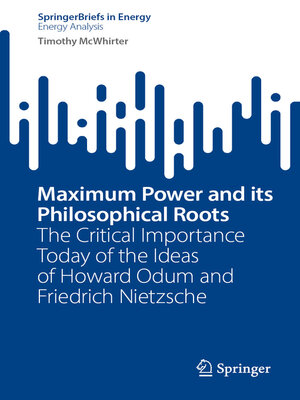Maximum Power and its Philosophical Roots
ebook ∣ The Critical Importance Today of the Ideas of Howard Odum and Friedrich Nietzsche · SpringerBriefs in Energy
By Timothy McWhirter

Sign up to save your library
With an OverDrive account, you can save your favorite libraries for at-a-glance information about availability. Find out more about OverDrive accounts.
Find this title in Libby, the library reading app by OverDrive.



Search for a digital library with this title
Title found at these libraries:
| Library Name | Distance |
|---|---|
| Loading... |
This Briefs volume focuses on the maximum power principle, which was created by the mathematician and physical chemist Alfred Lotka, and further developed and utilized most prominently by the systems ecologist H. T. Odum, who applied it to different physical, biological, ecological and economic systems. They both described this principle providing a thermodynamic framework for evolutionary theory. This principle has a philosophical heritage that has, until now, gone unrecognized. The 19th century philosopher Friedrich Nietzsche viewed his concept of the will to power as an empirical principle that describes how organic and inorganic systems develop in ways that grow in power. This book describes this interdisciplinary story: it discusses the development of both principles, reviews the empirical and theoretical support for them, critically examines their alleged limitations, and describes their philosophical implications, evidenced in a particularly provocative manner by Nietzsche's and Odum's critiques of moral and religious values.







